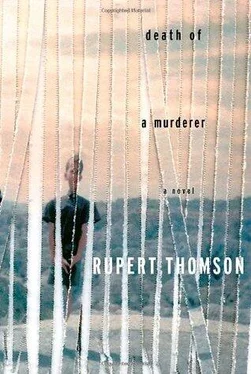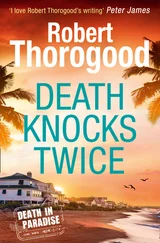Billy acted as if he hadn’t heard. He was making for the door that led out to the street. He had seen all he wanted to.
“Hey!”
Billy kept on walking.
Outside, the rain was coming down in great blown sheets. A filthy night. Lowering his head, he began to run, like someone guilty of wrongdoing.
After half a mile he slowed to a walk and turned into a cobbled alleyway. He was soaking wet, and panting; his throat burned. Cardboard boxes had been stacked against a wall of blackened brick. The back of a warehouse, by the look of it. Near by were several tall metal bins. The rain whitened as it dropped through the glare of a security light. Replaying the past couple of hours, he saw himself staring gormlessly at his father up on stage. He saw himself approach the table with the bland, blurred look of an idiot.
Hey, kid.
He went over to the closest bin and kicked it as viciously as he could. It toppled, then rolled into the middle of the alley. Rubbish spilled on to the cobble-stones. A bottle smashed. Not satisfied yet, not even remotely satisfied, he kicked another bin, but this one must have weighed more because it didn’t move at all. Pain flared in his right foot, and he bent down, clutching the toe of his shoe. “Fuck,” he said. “Shit.” Rain dripped down into his eyes. He picked up a piece of glass, pushed his coat-sleeve back and drew the makeshift blade across the outside of his forearm. It was like a magic trick, blood conjured out of nothing.
He caught the last train out of Lime Street. From Runcorn station, it was a twenty-minute walk, most of it uphill. The rain had stopped, but the pain in his foot was worse, and by the time he neared his house he was limping badly.
His mother was still awake when he got in. She looked up from the book that she was reading, and the soft, delighted look she usually greeted him with was quickly replaced by one of alarm as she noticed the blood on his sleeve.
“What happened to you?” she said.
“I got in a fight,” he said. “Someone came for me with a bottle.”
“Oh, Billy…”
He pushed his shirtsleeve back and showed her.
“That’s a nasty cut,” she said.
“It was my fault. I said something I shouldn’t have.”
“Why on earth—”
“It won’t happen again, Mum. I promise.”
She sat at the kitchen table, and he stood beside her, at her shoulder, as she swabbed the wound with iodine. It stung so much that it brought tears to his eyes. Different tears from the ones he’d imagined.
“You really ought to have stitches,” his mother said.
Billy told her it would be fine. “You’ve done a grand job,” he said, and leaning down, he gave her a kiss on the top of her head.
“What about your friend?” she said. “Did you see him?”
“Yes. There wasn’t any work, though.” He winced as he shifted his weight from one leg to the other. “I think I’ve hurt my foot.”
Their GP told him that he had broken three toes. He would tape them together, he said. Time would do the rest. “Just don’t kick any more cars,” he added, peering at Billy over the rims of his spectacles.
Billy grinned. “It was a dustbin, actually.”
He showed his damaged foot to Charlie when he came home for Christmas the following week. Charlie explained that the only important toe on your foot was the big one. If you lost your big toe, you wouldn’t be able to walk, he said. You might not even be able to stand up.
“So I broke something that doesn’t matter?” Billy said.
Charlie just looked at him and smiled.
This time she didn’t startle him. He sensed that he could rouse her simply by letting his thoughts drift in a particular direction. When he turned to face her, he saw that she was wearing the lilac suit again. Her eyebrows were plucked, and brown lines had been drawn on in their place. On the table in front of her were two packets of cigarettes. She must be thinking of staying for longer than usual. She’d come prepared.
No, he wasn’t startled, nor did he feel nervous. He had never appeared on TV, or on the front page of a national newspaper. The media were not in the habit of discussing his fate. He was an ordinary person, and yet her fame — her notoriety — had no impact on him.
“I’m ordinary too,” she said, little puffs of cigarette smoke emerging with the words. “If I hadn’t met him, I would have gone on being ordinary.”
That was debatable, of course. But it was the first time she had referred directly to the man who had been her lover, her mentor, the man who was now serving a life sentence in Ashworth, a high-security prison for the criminally insane. He had outlived her, even though he had been on a hunger strike for the past three years, and was being force-fed through a tube. He had outlived her, even though he was the one who wanted to die. He wouldn’t have been too happy when he heard the news.
“I’ve got a question for you,” Billy said. “Another question.”
Half an inch of ash teetered on the end of her cigarette. “Still no ashtray?” she said, looking round the room. “Oh well.” She held her cigarette over the drain and flicked the filter with her thumb. The ash tumbled softly through the air and disappeared. She turned back to him again, her pencilled eyebrows raised, which gave her a raffish, faintly sarcastic air.
“Who did you love most?” he said.
“My mother.” She hadn’t given herself time to think. She hadn’t needed to, perhaps. Either she had seen the question coming, or she had simply told the truth. She was still watching him, waiting to see how he would react to her answer, daring him to make something of it.
“What about your father?” Billy said.
“I don’t want to talk about him.”
Her father had been away fighting in the war until she was three. When he returned, she was sent to live with her grandmother. Later, crippled by an accident at work, he became a drinker, moody and violent.
“Your mother…” Billy nodded slowly. “I thought you might say that.”
“You don’t believe me?”
He looked away. It wasn’t that he didn’t believe her. It was just that the answer seemed predictable. He had somehow known that she wouldn’t be able to admit to loving the man with whom she’d committed those atrocities, the man whose name was now linked eternally, inextricably, with hers. From a distance of thirty years, she would have found that love hard to credit, let alone acknowledge. She would have had to call it something else — something less idealistic or more extreme. An obsession. A madness. She might even have blotted it out altogether. The knee-high boots and miniskirts. The nickname he had given her. The sado-masochistic sex. What’s more, she’d probably been in love with people since. That fellow inmate, for instance, the one who was a singer — and there were rumours of affairs with prison guards as well. The love she remembered, though, was the one that came first. A daughter’s love. He tried to imagine the woman as a little girl, but it made him feel uncomfortable. It was as if he were placing her on the same footing as her victims; it seemed insensitive at best, at worst a kind of violation. Yet there must have been a time, mustn’t there, when she was innocent? People didn’t want to think about that, of course. There was one image of her in the popular mind — the dyed-blonde hair, the brooding gaze — and that was it. There was no before, no after. No childhood, and no old age. Those photos taken in various prisons over the years — who were they supposed to fool? All those different hairstyles. That wasn’t her…And as he sat there at the table it suddenly occurred to him that he had never seen a picture of her as a child, not even one. Didn’t her mother have any? If not, what had happened to them? Had they been suppressed? Destroyed? It was a strange absence, unsettling, almost unjust, though he thought he understood the need for it.
Читать дальше












